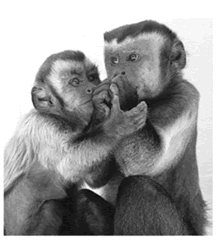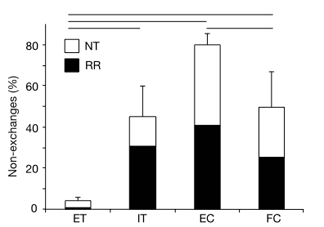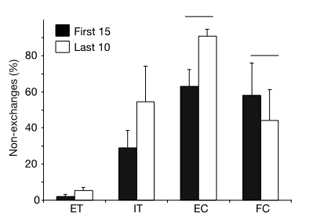« Employment opportunities in decision science | Main | Irrational or just wary? »
October 04, 2004
Nonhuman primates discovered to have a sense of fairness
MONKEYS REJECT UNEQUAL PAY

A juvenile capuchin monkey exhibits cheek-to-cheek begging to an eating adult male, cupping his hand next to the adult's food in solicitation. This primate is exceptionally tolerant and readily shares food, which may be a precondition for the reported reactions to reward division.
Humans judge fairness according to both the distribution of gains and possible alternative outcomes. There may be species-specific responses concerning the way one ought to be treated in a society and how gains should be distributed. For example, species with highly developed food sharing and cooperation, such as the Capuchin monkeys, may have emotionally-charged predispositions for various expectations about how gains should be distributed. A recent study in Nature by Sarah F. Brosnan and Frans B. M. de Waal examines the responses of 5 female capuchin monkeys to an unequal distribution of gains during experimental exchange with a human experimenter. Females were paired and observed under four exchange conditions: 1) both females received the same reward, 2) one female received a superior reward, 3) one female received a superior reward without exchange (i.e., no work), and 4) a single female observed a superior reward in the absence of a partner.
Monkeys too, it seems, respond negatively to an unequal distribution of gains. They will respond negatively to a previously acceptable gain if their partner receives a better one. Clearly if these emotions evolved in humans to aid in long-term human cooperation, they may exist in other species as well.
"In preliminary studies, two conditions were used: equality, in which two monkeys exchanged tokens with a human experimenter to receive cucumber, and inequality, in which one monkey exchanged for cucumber and its partner for grape, a more favoured food. Whereas in previous tests males and females had been equally reliable exchangers, only females reacted differently to the two conditions. Compared with equality tests, females receiving the less favoured reward in inequality tests were less willing to exchange, whereas males showed no such effect. Our limited sample size did not allow a conclusive comparison of the sexes, but independent evidence indicates that capuchin females pay closer attention than males to the value of exchanged goods and services."

Percentage of failures to exchange for females across the four test types. Black bars (RR) represent the proportion of non-exchanges due to refusals to accept the reward; white bars (NT) represent those due to refusals to return the token. Lines indicate significant differences between conditions (Tukey's multiple comparisons). ET, equality test; IT, inequality test; EC, effort control; FC, food control.

Mean percentage of failures to exchange in the first 15 trials (black bars) versus the last 10 trials per test (white bars). Lines at top indicate significant differences.
Quotes:
"During the evolution of cooperation it may have become critical for individuals to compare their own efforts and pay-offs with those of others. Negative reactions may occur when expectations are violated. One theory proposes that aversion to inequity can explain human cooperation within the bounds of the rational choice model, and may in fact be more inclusive than previous explanations. Although there exists substantial cultural variation in its particulars, this 'sense of fairness' is probably a human universal that has been shown to prevail in a wide variety of circumstances. However, we are not the only cooperative animals, hence inequity aversion may not be uniquely human. Many highly cooperative nonhuman species seem guided by a set of expectations about the outcome of cooperation and the division of resources."
"Failure to hand back a received token (NT) is a highly unusual response in our trained capuchins: in two years of bartering, such failures occurred in less than 5%of trials, as also seen in the equality test. The marked increase in failure to exchange in individuals receiving the lower-value reward in the inequality test and the two control conditions cannot be explained by the absence of positive reinforcement, as rewards continued to be cucumber, an accepted reward in the equality test. Even more curious than a drop in the conditioned response rate was the second manner in which exchanges failed: refusal to accept or consume the reward (RR). In doing so, subjects forfeited a directly accessible food that they readily accept and consume under almost any other set of circumstances."
"One possible explanation is that reward rejections relate to violated expectations, in which monkeys forego a low-value reward if a high-value one is anticipated. On the basis of her own reward history, however, there would seem no reason for a subject receiving cucumber to expect anything else during the same test."
"Capuchin monkeys, too, seem to measure reward in relative terms, comparing their own rewards with those available, and their own efforts with those of others."
"As opposed to primates marked by despotic hierarchies, tolerant species with well-developed food sharing and cooperation, such as capuchins may hold emotionally charged expectations about reward distribution and social exchange that lead them to dislike inequity."
About the authors:
Dr. Frans B. M. de Waal;

Currently, Frans B.M. de Waal is the Charles Howard Candler Professor of Psychology and Director of the Living Links Center at the Yerkes National Primate Center, both at Emory University. Born in 1948, in the Netherlands he was trained as a zoologist and ethnologist in the European tradition at three Dutch universities Nijmegen, Groningen, Utrecht), resulting in a Ph.D. in biology from the University of Utrecht, in 1977. His dissertation research concerned aggressive behavior and alliance formation in macaques. In 1975, a six- year project was initiated on the world's largest captive colony of chimpanzees at the Arnhem Zoo. Apart from a large number of scientific papers, this work found its way to the general public with Chimpanzee Politics (Johns Hopkins University Press, 1982).
Frans B.M. de Waal homepage
Dr. Sarah F. Brosnan

Currently Dr. Brosnan is a postdoctoral fellow in the department of anthropology at Emory University. Her primary interests are the evolution of social behavior and social cognition, particularly the cognitive processes underlying cooperation and reciprocity and economic behavior. Specifically, what interest her is the proximate mechanisms underlying such behaviors, particularly how animals perceive the value of different commodities in their reciprocal interactions (i.e., goods and services exchanged within a biological market) and how the social environment affects the acquisition and use of such a concept of value. Currently she is working on a number of different projects in both humans and nonhuman primates (particularly chimpanzees) in an effort to understand more about the evolution of cooperative and economic behavior across the primate lineage.
Sarah F. Brosnan homepage
Posted by DSN at October 4, 2004 10:40 PM